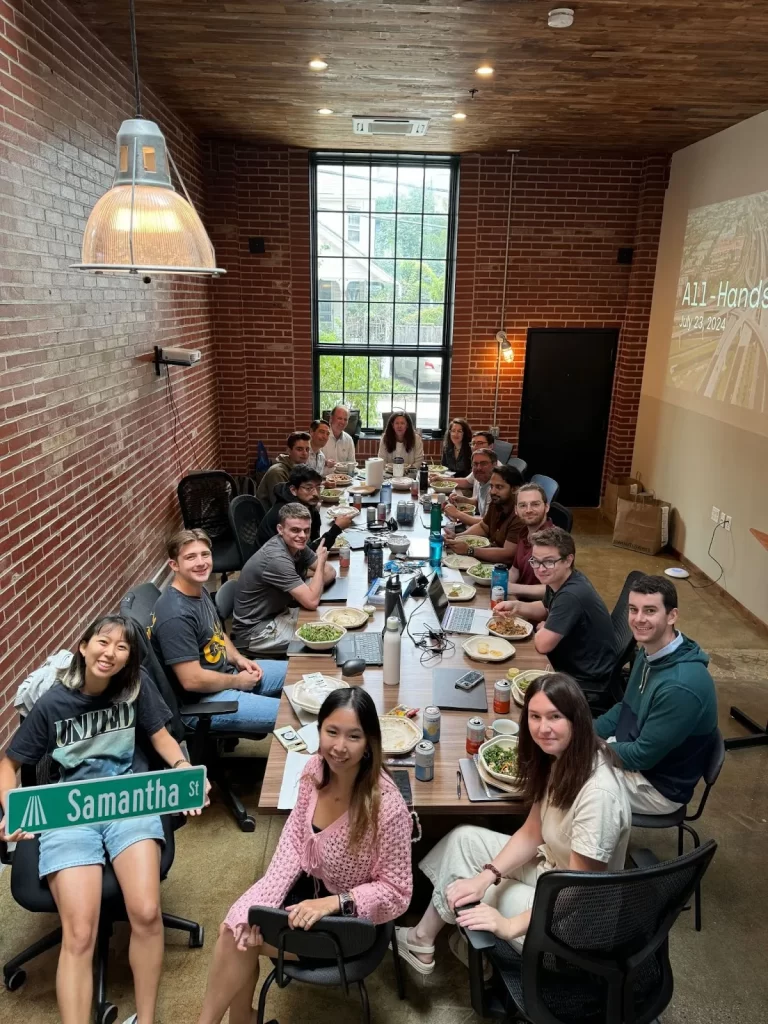
Founders: Noah Budris, Noah Parker, Daniel Pelaez
Founding: 2021
Mission: Accelerate the future of infrastructure
Employees: 25 & 100% Local
Workplace: Onsite
Stage & Capital Raised: Series A & $10M raised
Investors: Companyon Ventures, Argon Ventures, AeroX Ventures, Alumni Ventures, MassVentures, Launch Capital, RiverPark Ventures, Launchpad Venture Group, and Hub Angels
Key Customers: Collier Engineering Co., Civiltech Solutions, Horrocks, Environmental Partners, The LiRo Group
Glassdoor Rating: N/A
Valuation (estimated): $20M – $75M (assuming average dilution from the 2024 $6M Series A fundraise)
^ this is a useless number from MGMT Boston. There is no tangible valuation until the business is sold or goes public. Don’t forget it!
Cyvl is a hardware enabled software platform building the “easy button for public works departments”. This growth stage startup is changing the roadmap, quite literally, of our towns and cities so that local governments and municipalities can make better decisions about how to allocate their resources and build better infrastructure.
Daniel Pelaez needed a summer job. After his freshman year at WPI he didn’t land an electrical engineering internship so he answered an urgent “help wanted” ad in his local newspaper at the Southbury Public Works department on their road crew. Daniel showed up at sunrise for his first assignment. The plan? Everyone drive around and find things that are broken. There were some shorthand priority lists and calls from residents to answer but no system of record in sight. It was pretty eye opening!
At WPI, Daniel studied robotics and self-driving technology as the cost of sensors (LiDAR specifically) really began to come down with production scaling and computer vision technology becoming more commercially viable. He never forgot about his experience at Southbury Public Works.
Our infrastructure is aging. If it were a student, well it would be near academic probation. America’s infrastructure is a C- according to the American Society of Civil Engineers. The roads? They receive a D grade (src). Not exactly honor society level. In 2021 President Biden signed the Infrastructure Investment and Jobs Act, a $1.2T infrastructure bill, for projects across the country. The bill specifically includes $100B+ for rebuilding roads and bridges (src).Those are significant funds to hire civil engineering firms to do citywide audits and hire people to drive & walk around with clipboards to survey our roads and infrastructure before any roads get paved.
Roads are how we get to work, school, access hospitals, and enjoy our time. Without strong core infrastructure, our lives are negatively affected. Every town has a data problem, struggling to reconcile the physical world and digital domain. Public works departments face challenges maintaining their workforce in the years ahead (src).
What if we could use sensors & computer vision to help cities & towns like Southbury make better infrastructure decisions and maintain institutional knowledge?
Daniel and his roommate, Noah Budris, started talking to tons of prospective customers while at WPI. They would skip class and drive to public works departments at 6am to chat with the road crews before work and listen to their problems. Soon joined by classmate Noah Parker, the trio set out to build a hardware enabled software platform for public works.
Once you digitize your infrastructure, it becomes easier to manage and maintain through software. Making decisions about infrastructure is hard enough, Cyvl aspires to make that data more transparent to empower the department of public works officials. By creating a more transparent infrastructure ecosystem, more maintenance and building can happen faster. The team sends their sensors to towns and cities (often in partnership with a civil engineering firm) to digitally survey the roads. They’ll process all that visual data and crunch 3D maps using computer vision algorithms to understand the defects in the roadways based on civil engineering standards. Their team uses the latest research & technology in LiDAR, visual mapping, and GPS to build an integrated solution that makes sense for governments.
Cyvl’s platform collects the data, processes it using AI (which is their true differentiator), and then analyzes it to help governments make better decisions. Cyvl’s vision to build the Easy Button for public works departments and their roadways, helping accelerate all aspects required for building and maintaining physical infrastructure.
Road assessments are historically expensive and Cyvl is enabling towns and cities to do them more often due to the ease & reduced costs of data collection. Today, Cyvl’s platform maps roads – the largest asset (50%+) within transportation infrastructure – and will pursue opportunities over time to capture bridges, sidewalks, water & sewer, tunnels, rail infrastructure, power lines, and even trees. Basically, everything a city needs to operate its budgets and keep systems functional. There are other future opportunities to integrate satellite imagery, integrate self driving car company data, or even package delivery fleets to create & enrich ongoing roadway data too.
From their first $500 pilot in 2021, Cyvl is now signing seven figure contracts with cities and has dozens of customers. The team recently surpassed seven figures of ARR as they grow into a category leader. As cities see success, neighboring cities have begun adopting more quickly.
Cyvl is racing to close out 2024 on a strong note, in final negotiations with two of the largest cities in the U.S., to drive continued momentum into 2025. They have 30+ sensors currently deployed and have scaled from mapping 100s of miles per week to 1000s of miles per week, continuing to scale out their data collection & infrastructure.
In April of 2024 they raised a $6M Series A led by Companyon Ventures and hired a number of key players, including Dan McCarthy to lead their Product team. In the coming months they’ll be looking to add a VP of Sales and continue to scale their team across Engineering and other functions. It’s always about the team!
Operators to Know:
- Alex Ball, Full Stack Engineer
- David Corsi, Manufacturing Process Engineer
- Shannon Cunnane, Founding Customer Success Manager
- Jonathan Fisher, Mapping Analyst
- Jeff Greim, Sales Manager
- PJ Mara, Robotics Engineer
- Fernando Mazzoni, Data Scientist
- Dan McCarthy, VP of Product
- John Pignato, Software Engineer, Infrastructure (DevOps)
- Likith Ponnanna, Senior Machine Learning Engineer
- Emma Shechtman, Marketing Manager
- Tanya West, Sales Manager
- Samantha Yi, Operations Manager
My investigative powers continue to need work so apologies to the Cyvl team I know I missed many up & coming operators internally
Key Roles To Be Hired:
- Account Executive
- Senior Product Designer
- Senior Data Engineer
- Senior Machine Learning Engineer
- Senior Software Engineer
- VP of Sales
If I were interviewing here are some questions I’d ask:
- What are the key milestones for Cyvl as we head toward 2025?
- What are the biggest challenges as you scale the team past 25 employees?
- How is Cyvl planning to go to market in 2025 as it enters the growth stage?
- What are the most important roles you’ll be looking to add in 2025 // teams that need the most help?
We’re optimizing for readability here so to learn more about Cyvl you’ll have to D.Y.O.R. I’m excited to watch this team bring more cities & local governments into the digital age. All citizens applaud your efforts. See you around town!
